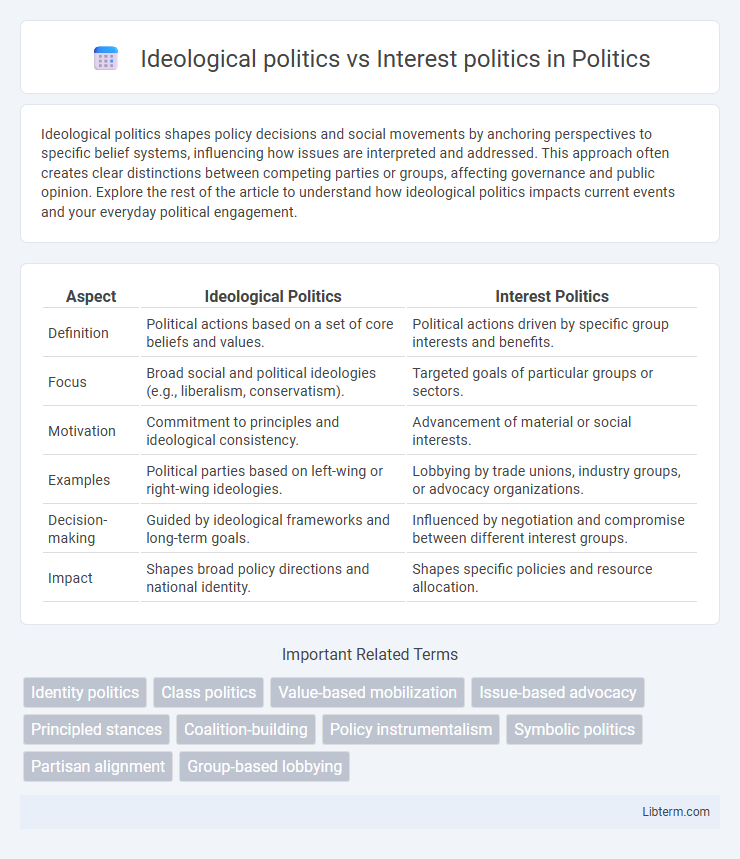Ideological politics shapes policy decisions and social movements by anchoring perspectives to specific belief systems, influencing how issues are interpreted and addressed. This approach often creates clear distinctions between competing parties or groups, affecting governance and public opinion. Explore the rest of the article to understand how ideological politics impacts current events and your everyday political engagement.
Table of Comparison
| Aspect | Ideological Politics | Interest Politics |
|---|---|---|
| Definition | Political actions based on a set of core beliefs and values. | Political actions driven by specific group interests and benefits. |
| Focus | Broad social and political ideologies (e.g., liberalism, conservatism). | Targeted goals of particular groups or sectors. |
| Motivation | Commitment to principles and ideological consistency. | Advancement of material or social interests. |
| Examples | Political parties based on left-wing or right-wing ideologies. | Lobbying by trade unions, industry groups, or advocacy organizations. |
| Decision-making | Guided by ideological frameworks and long-term goals. | Influenced by negotiation and compromise between different interest groups. |
| Impact | Shapes broad policy directions and national identity. | Shapes specific policies and resource allocation. |
Understanding Ideological Politics
Ideological politics centers on a coherent set of beliefs and values that shape policy preferences and drive political behavior, emphasizing principles over practical gains. This form of politics often involves long-term goals oriented toward social justice, equality, or conservatism, transcending immediate material interests. Understanding ideological politics requires analyzing how deep-seated convictions influence voter alignment and party platforms more than short-term individual or group benefits.
Defining Interest Politics
Interest politics centers on specific groups advocating for policies that directly benefit their economic, social, or professional agendas, often prioritizing pragmatic outcomes over broad ideological frameworks. These groups, such as labor unions, business associations, or advocacy organizations, mobilize resources and influence lawmakers to secure favorable legislation or regulation. Unlike ideological politics, which is driven by overarching belief systems and values, interest politics is grounded in tangible, material concerns and immediate stakeholder interests.
Key Differences Between Ideological and Interest Politics
Ideological politics centers on broad-based principles and values that shape policies and political behavior, while interest politics focuses on specific group benefits and practical outcomes. Ideological politics often involves large-scale social change and commitment to a consistent worldview, whereas interest politics is pragmatic, driven by immediate needs and tangible rewards for organized groups. The key difference lies in the scope and motivation: ideological politics pursues normative goals reflecting collective ideals, while interest politics targets particularistic objectives grounded in material advantages.
Historical Evolution of Ideological and Interest Politics
The historical evolution of ideological politics traces back to the Enlightenment era, where foundational political philosophies like liberalism, conservatism, and socialism emerged, shaping modern political systems through competing visions of society. Interest politics developed alongside industrialization and the rise of pluralist democracies, focusing on organized groups pursuing specific economic, social, or professional benefits within political frameworks. Over time, ideological politics has influenced normative values and long-term goals, while interest politics has concentrated on pragmatic policy outcomes and resource allocation.
The Role of Political Parties in Ideological vs Interest Politics
Political parties in ideological politics champion a coherent set of beliefs and values, shaping policy agendas and voter identity around core principles such as liberalism, conservatism, or socialism. In interest politics, parties predominantly serve specific groups or economic sectors, mobilizing support to advance targeted material benefits like labor rights, industry subsidies, or tax relief. The distinct role of parties reflects their dual function: in ideological contexts, they act as agents of systemic change, whereas in interest-driven politics, they operate as intermediaries negotiating power and resources among competing stakeholders.
Impact on Policy-Making and Governance
Ideological politics shapes policy-making by grounding decisions in broad value systems and long-term visions, often leading to comprehensive but sometimes rigid governance frameworks. Interest politics, driven by specific group demands and pragmatic concerns, results in more flexible and targeted policies that directly address stakeholder needs but may cause fragmented governance. The interplay between these forces influences the balance between principled leadership and responsive administration in policy outcomes.
Case Studies: Real-World Examples
Ideological politics often drives movements such as the Civil Rights Movement in the United States, where activists pursued systemic change based on principles of equality and justice, contrasting with interest politics exemplified by labor unions advocating for specific worker benefits and protections. The environmental policy debates in the European Union showcase ideological politics through green parties emphasizing ecological sustainability, whereas interest politics is evident in industry lobbyists negotiating subsidies and regulations favorable to their sectors. These case studies illustrate how ideological politics seek broad societal transformation, while interest politics concentrate on targeted group advantages within political frameworks.
Voter Behavior in Ideological and Interest-Based Systems
Voter behavior in ideological politics often reflects strong alignment with core values and beliefs, leading to consistent support for parties or candidates that represent specific ideologies. In contrast, interest-based political systems see voters prioritizing tangible benefits and policy outcomes that align with their material needs or group affiliations, resulting in more pragmatic and fluctuating electoral choices. Understanding these dynamics helps explain variations in voter loyalty, turnout, and issue salience across different political environments.
Challenges and Criticisms of Both Approaches
Ideological politics often faces criticism for promoting rigid, dogmatic beliefs that can polarize societies and hinder pragmatic policy solutions. Interest politics, while more pragmatic, is challenged for prioritizing narrow group agendas, potentially leading to unequal representation and neglect of broader public good. Both approaches struggle with balancing effective governance and inclusive decision-making in diverse democratic systems.
Future Trends in Ideological and Interest Politics
Future trends in ideological and interest politics reveal increasing polarization as digital platforms amplify niche ideologies and mobilize interest groups with precision targeting. Data analytics and AI-driven strategies enhance the ability of interest politics to influence policy by tailoring campaigns to specific voter demographics. Emerging technologies and social media algorithms intensify ideological echo chambers, challenging democratic discourse and fostering more fragmented political landscapes.
Ideological politics Infographic

 libterm.com
libterm.com